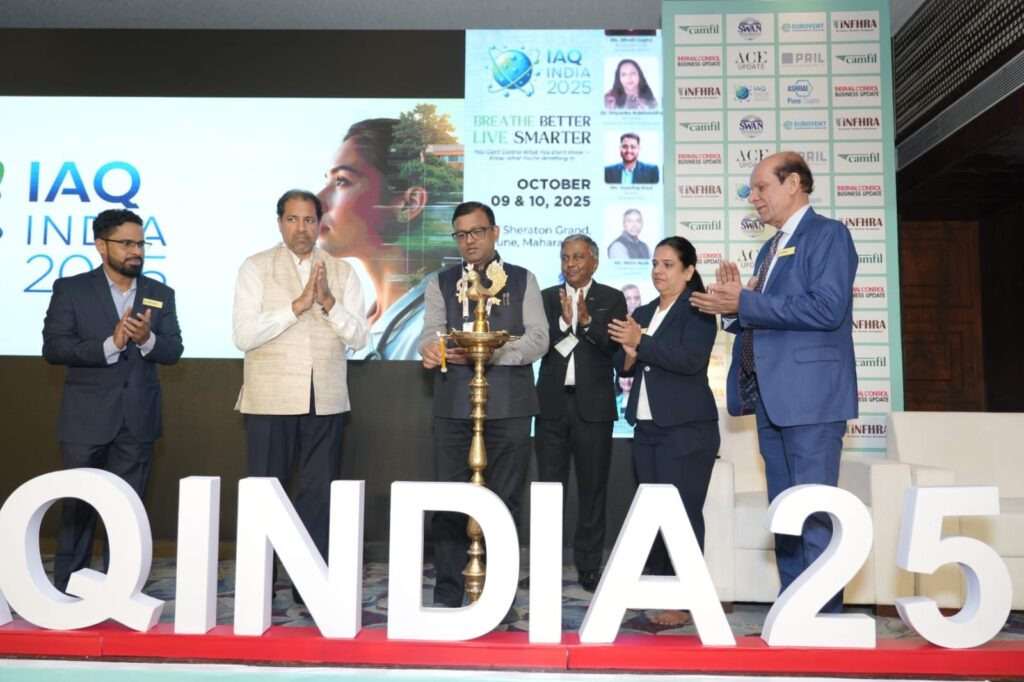Pune Hosts IAQ India 2025, Driving Clean Air And Healthy Indoor Living

Pune Hosts IAQ India 2025, Driving Clean Air And Healthy Indoor Living
Pune, October 10, 2025:
India’s premier conference and exhibition dedicated to Indoor Air Quality (IAQ), IAQ India 2025, began today at the Hotel Sheraton Grand, Pune, bringing together policymakers, researchers, architects, technology providers, and public health experts. The two-day event aims to accelerate India’s transition toward healthier, sustainable, and people-centric indoor environments.
Dr. Bhagawan Patil, Deputy Director of Health Services, Pune Circle, inaugurated the event as Chief Guest. Delivering his keynote on “Air Quality Challenges, Health Impacts, Actions & Future of Pune,” Dr. Patil outlined his department’s ongoing efforts to address air quality challenges across the region.
“Recognising the seriousness of the problem, we have strengthened air quality monitoring and data integration in partnership with the Maharashtra Pollution Control Board (MPCB) and SAFAR (IITM Pune) to ensure real-time data is available for both citizens and decision-makers,” he said.
He highlighted initiatives such as public awareness campaigns in schools and communities to educate people about precautions during high-pollution days, discouraging open burning, and promoting behavioural change. The department, he noted, has enhanced healthcare preparedness through special respiratory clinics, wider availability of nebulisers and inhalers, and training for doctors to identify pollution-related health issues early. Coordination with PMC, PCMC, and the Zilla Parishad continues to focus on dust control at construction sites and strengthening waste-segregation systems.
“Looking ahead, our vision is clear – K to make Pune a model city for clean air and healthy living,” Dr. Patil added. “Our success will depend on collective participation. Government, industry, academia, and citizens must work together, combining technology, research, and awareness to build a cleaner and healthier future. Clean air is not a luxury; it is a fundamental right essential for the future of our children.”
The conference underscores that indoor air quality is no longer a niche concern – it directly impacts public health, workplace productivity, and community well-being. With India’s rapid urbanisation and rising pollution levels, IAQ India 2025 has emerged as a national platform connecting science, policy, and design to drive collective action.
Delegates are engaging in sessions that address the urgent need for cleaner indoor environments through knowledge exchange, technology showcases, and collaborative frameworks aligned with India’s health and sustainability goals. Alongside the conference, visitors can explore innovations in air purification, ventilation systems, sensors, and smart building management solutions showcased by leading companies and research institutions.
Delivering the Conference Keynote,
Vikram Murthy, Conference Chair, AHRI India Representative & Director, Univac Environment Systems, spoke on “Air Quality at Crossroads: Bridging Public Health, Policy, and Urban Development.” He emphasised the growing air quality challenges in Indian cities and their direct impact on productivity and well-being.
“Air quality must be treated as a cornerstone of sustainable urban growth,” Mr. Murthy noted, calling for integrated policies that connect healthcare, building standards, and urban development.
Co-Conference Chair, Ashish Rakheja, Fellow ASHRAE, ISHRAE and Sr. Fellow IGBC; Managing Partner, AEON Consultant, highlighted the deep interlinkage between ambient and indoor air quality. “Most Indian cities experience hazardous levels of PM2.5, NOx, and other pollutants that infiltrate indoor spaces. The lack of enforceable IAQ standards and public awareness leads to unhealthy buildings that fail to protect occupants,” he said.
Rakheja stressed the need for a multi-pronged approach integrating design, technology, and policy – including filtered mechanical ventilation, low-emission materials, and real-time IAQ monitoring. Post-COVID learnings, he added, have further reinforced the value of ventilation and purification in shared spaces.
Mr. Vanshaj Kaul, Director, Eurovent India, remarked, “IAQ India 2025 is dedicated to promoting healthier, smarter, and more sustainable indoor environments. Clean indoor air is vital to our comfort, productivity, and long-term health. I applaud the organisers for bringing together experts and innovators to drive collective action for cleaner air and a better future.”
Day One of IAQ India 2025 focused on Air Quality, Public Health, and Policy Frameworks, while Day Two will explore Design, Technology, and Operational Excellence.
Organised by Thermal Control Magazine, the event represents a landmark effort to mainstream IAQ as a national agenda, aligning with India’s broader sustainability and public-health missions.
IAQ India 2025 reaffirms that clean indoor air is not merely a comfort parameter — it is a cornerstone of human well-being and sustainable urban living.
PIC CAPTION :
Chief Guest, Dr. Bhagawan Pawar (Deputy Director of Health Services, Pune Division), Mr. Vikram Murthy (AHRI India Representative), Mr. Ashish Rakheja (Fellow ASHRAE, ISHRAE, and Senior Fellow IGBC) Radha Poptani (IAQ India), Prasad Nair (IAQ India)









